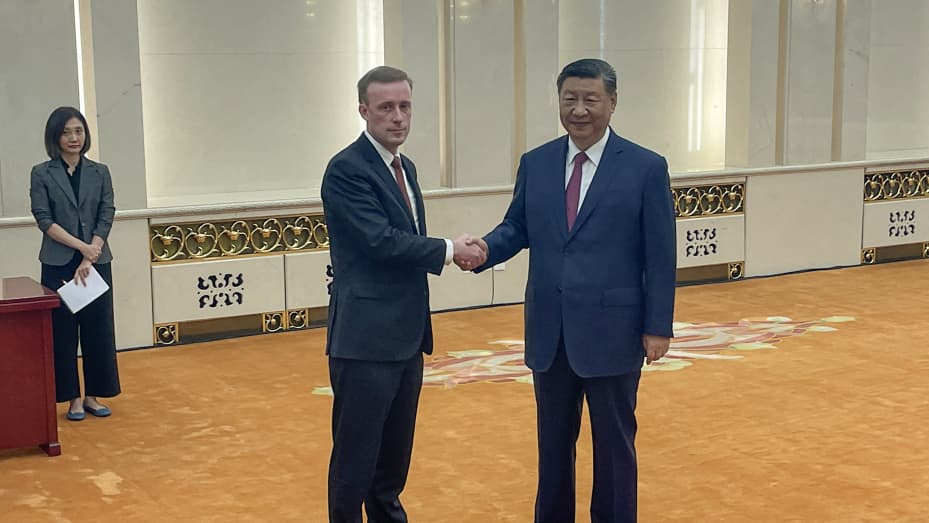Key Points
- Chinese President Xi Jinping told U.S. national security advisor Jake Sullivan during a meeting Thursday that China hopes the United States would find “a right way” to get along.
- Tensions between the world’s two largest economies have escalated in recent years spilling over from trade into finance and technology.
- This is Sullivan’s first trip to China as U.S. national security advisor, and the first by a person in that role since 2016.

–> US National Security Advisor Jake Sullivan shakes hands with China’s President Xi Jinping during their meeting at the Great Hall of the People in Beijing on August 29, 2024.
Trevor Hunnicutt
Chinese President Xi Jinping recently held a significant meeting with U.S. National Security Advisor Jake Sullivan in Beijing, marking a pivotal moment in the ongoing and complex relations between the world’s two largest economies. The meeting, which took place amid rising tensions between China and the United States, highlights the importance both nations place on maintaining open channels of communication, despite their numerous disagreements on issues ranging from trade and technology to security and human rights.
During the meeting, President Xi emphasized China’s commitment to fostering a stable, healthy, and sustainable relationship with the United States. He acknowledged the significant changes that have occurred in both countries and in their bilateral relations, yet reiterated that China’s goal of a constructive partnership remains unchanged. Xi’s message was clear: China seeks a pathway to coexistence that is mutually beneficial and respects the differing systems and interests of both nations.
Xi’s remarks also conveyed a desire for the United States to adopt a more positive view of China’s development. This is a recurring theme in Chinese diplomatic rhetoric, as Beijing often expresses concern that Washington perceives China’s rise as a threat rather than an opportunity for cooperation. Xi urged the U.S. to work alongside China to find a “right way” for the two major powers to interact, suggesting that the future of global stability may hinge on how effectively these two countries can manage their differences.
Jake Sullivan’s visit to China, his first as National Security Advisor, was part of a broader diplomatic effort by the Biden administration to stabilize the increasingly fraught U.S.-China relationship. Sullivan’s meetings with top Chinese officials, including Zhang Youxia, vice chairman of the Chinese Communist Party’s Central Military Commission, and Wang Yi, China’s top diplomat, were aimed at laying the groundwork for more constructive engagement. The discussions covered a wide range of topics, from security concerns to economic issues, reflecting the broad and intertwined nature of U.S.-China relations.
One of the key takeaways from Sullivan’s visit was the reaffirmation of the importance of maintaining high-level communication between the two countries. The meeting comes at a time when both sides are navigating a complex international landscape, with tensions not only between the U.S. and China but also involving other global powers. The ability of Beijing and Washington to manage their bilateral relationship will have significant implications for global peace and stability.
The backdrop to this meeting is the ongoing rivalry between the U.S. and China, which has intensified in recent years. The trade war initiated during the Trump administration has expanded into a broader strategic competition, encompassing technology, military influence, and diplomatic clout. The Biden administration, while adopting a somewhat different tone, has largely continued the tough stance on China, reflecting a bipartisan consensus in Washington that views Beijing as the most significant long-term challenge to U.S. global leadership.
Despite these tensions, both countries recognize the need for cooperation on global issues such as climate change, public health, and nuclear non-proliferation. The meeting between Xi and Sullivan may signal a willingness on both sides to find common ground in these areas, even as they continue to compete in others. The upcoming phone call between President Biden and President Xi, as mentioned by the White House, will be another critical moment in the diplomatic efforts to manage this complex relationship.
The U.S. political landscape also plays a role in shaping its approach to China. The upcoming presidential election, with Kamala Harris as the Democratic nominee following President Biden’s withdrawal from the race, adds another layer of uncertainty. Both political parties in the U.S. agree on the need to be tough on China, which means that regardless of the election outcome, the U.S. is likely to maintain a firm stance on key issues in its relationship with Beijing.
Sullivan’s trip to Beijing, and the meetings held there, underscore the delicate balance both nations are trying to achieve: managing competition without allowing it to spiral into conflict. This delicate dance will likely continue to define U.S.-China relations for the foreseeable future, with both sides seeking to protect their national interests while avoiding an open confrontation. The outcome of these efforts will have profound implications not just for the two countries involved, but for the entire world.